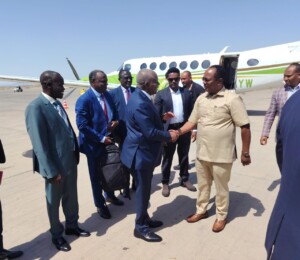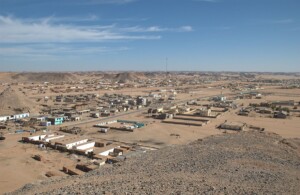Sudan unrest: Police assault protestor
Protests sparked in Khartoum on August 17, the day which marks the one-year anniversary of the signing of the Constitutional Declaration, continued yesterday, while sit-ins continue across the country calling for justice and security in Sudan, with mixed results.
 Protesters block roads and demand the govt to keep to the principles of the revolution in Khartoum on August 19, 2020 (Social media)
Protesters block roads and demand the govt to keep to the principles of the revolution in Khartoum on August 19, 2020 (Social media)
Protests sparked in Khartoum on August 17, the day which marks the one-year anniversary of the signing of the Constitutional Declaration, continued yesterday, while sit-ins continue across the country calling for justice and security in Sudan, with mixed results.
Members of the Resistance Committees in Khartoum are still blocking main roads, including the road to Wad Madani, in the capital, demanding a return to the principles of the revolution.
The Resistance Committees active in El Deyoum East reported that one of its members was assaulted by policemen on Tuesday evening. According to the committees, a young man was held by three policemen, who “beat him up and burned the skin of his chest with a hot and sharp object”. They also told him not to participate in future protests.
The sit-in in Karari locality in Omdurman has now entered its fifth day.
Yesterday, the Governor of Khartoum, Ayman Khalid, met with representatives of the sit-in. He pledged to dismiss the locality director and the heads of administrative units, along with other officials related to the former regime of Omar Al Bashir. A committee will be formed that will remove corrupt locality officials within two weeks. He said he would dismiss the Karari locality director within 24 hours.
The governor further ordered the replacement of the waste management officer in order to improve sanitation. This will coincide with the formation of a committee to investigate regular water and power outages.

Activists in Sudan’s Kassala blocked the bridge linking the east and west of the town to mark the 27th day of the sit-in. They have demanded the dismissal of the recently appointed governor of Kassala. A spokesperson for the protestors said they will not open the bridge until demands are met.
The spokesperson also said that state media are yet to report on the activities of the sit-in.

People in Tokar locality in Red Sea state called for the dismissal of the head of the state's Emergency Committee and the director of Tokar Delta project, by organising a vigil in front of locality offices yesterday.
They also call for compensation for the victims of recent floods, the completion of the water and electricity network, and an investigation into the failure of the irrigation plans in the area.
They asked Abdallah Shangarai, the state governor, to visit in order to “see with his own eyes how the flood victims are surviving in the open and in schools after their homes collapsed and they lost all their sorghum stocks.” The governor is yet to react to this demand.

Yesterday, hundreds of workers of the Kenana Sugar Company in White Nile state went on strike and held a protest vigil in front of the company's Workers Union. They are demanding that the company's management’s meet the union’s steering committee.
The steering committee said they will continue the strike until their demands are met, which focus on equal treatment of all workers.
South Darfur
In Buram locality in South Darfur, people organised a sit-in in front of the locality’s offices yesterday. They are demanding the dissolution of the Buram security committee and the Chamber of Commerce, and the removal of all other officials affiliated with the former regime.
The protesters also demand “radical solutions” for the shortages of water and medical staff, and protection against armed robberies and other attacks in the region.
Success model
On 4 August, seven sit-ins in Sudan calling for security and stability, justice, and better basic services have been lifted after the authorities promised to meet their demands. Most of the sit-ins lasted for over two weeks.
In a statement issued July 12, the Darfur Bar Association (DBA) said that the model of peaceful sit-ins can be developed through organised programmes and activities developed by the demonstrators themselves, such as local conferences, technical and specialised workshops, focus groups, interviews, lectures and seminars, and employing audio and visual media to display issues and problems in each region.
The overall aim should be to establish a permanent dialogue mechanism, engagement with the authorities in Khartoum and the states, and the development of medium to long-term strategic plans which outlines proposals for solutions, that are to be implemented by the authorities and those responsible for organising the sit-ins, according to the DBA.
Radio Dabanga’s editorial independence means that we can continue to provide factual updates about political developments to Sudanese and international actors, educate people about how to avoid outbreaks of infectious diseases, and provide a window to the world for those in all corners of Sudan. Support Radio Dabanga for as little as €2.50, the equivalent of a cup of coffee.












 and then
and then